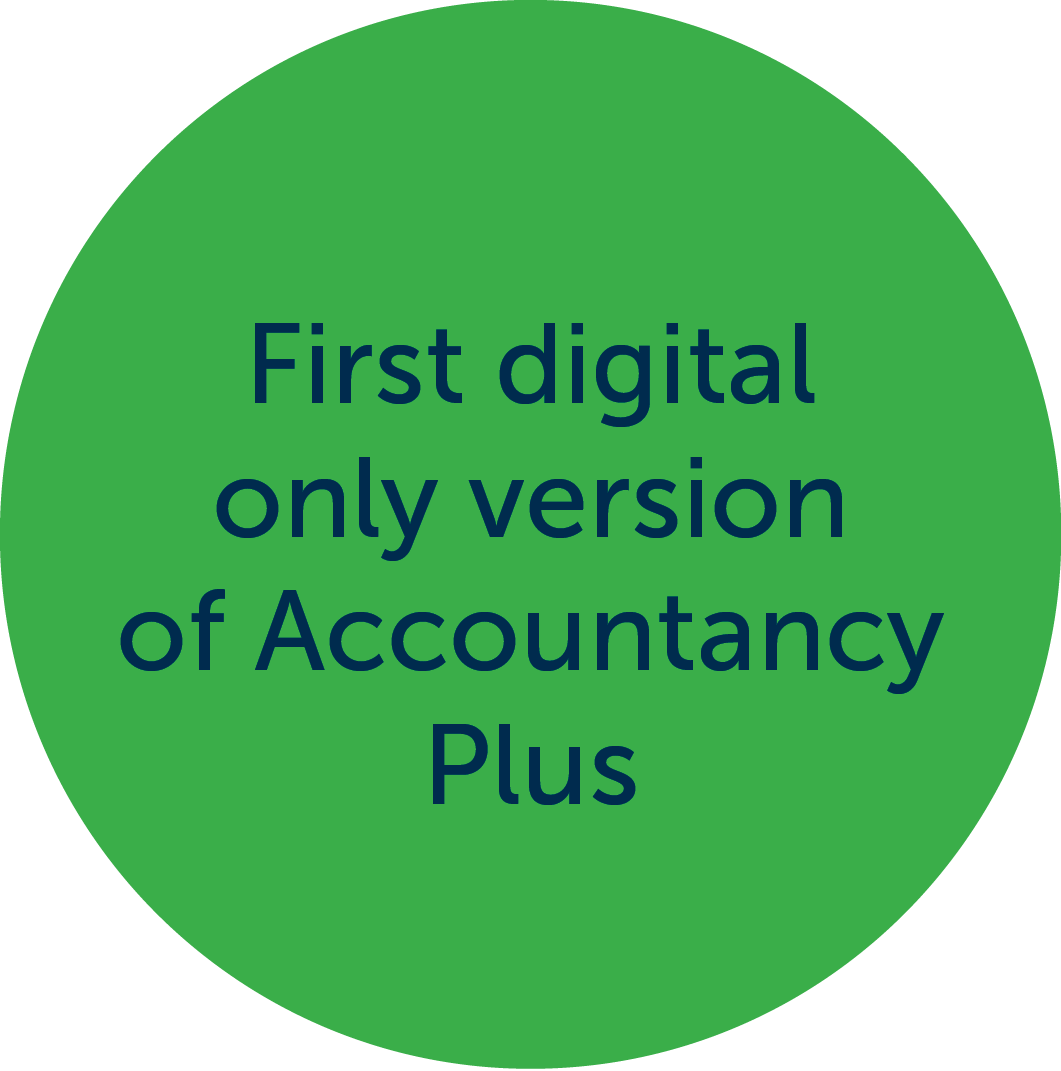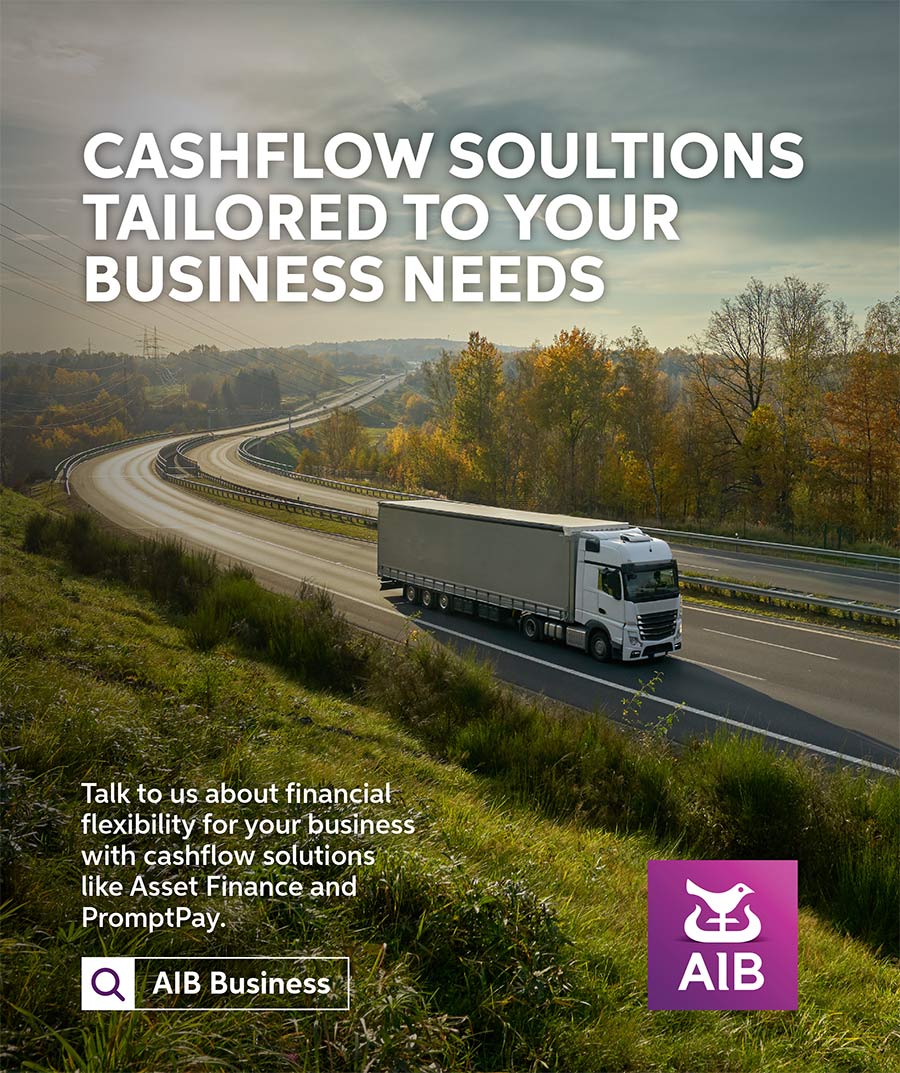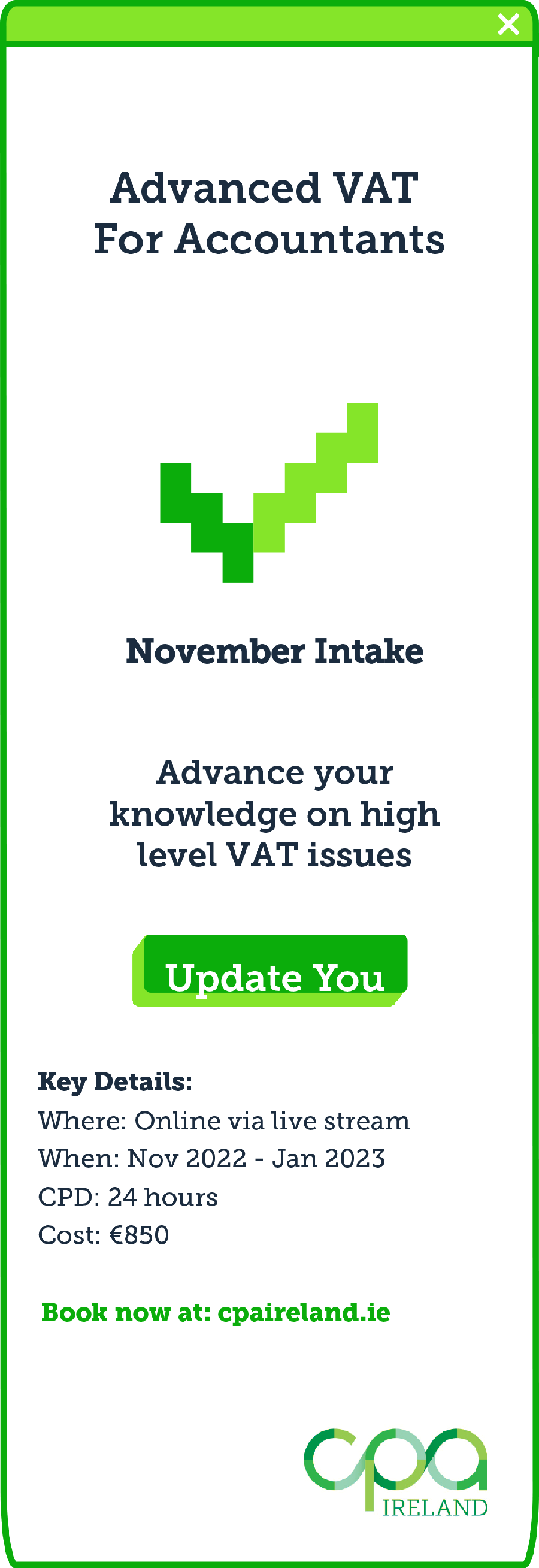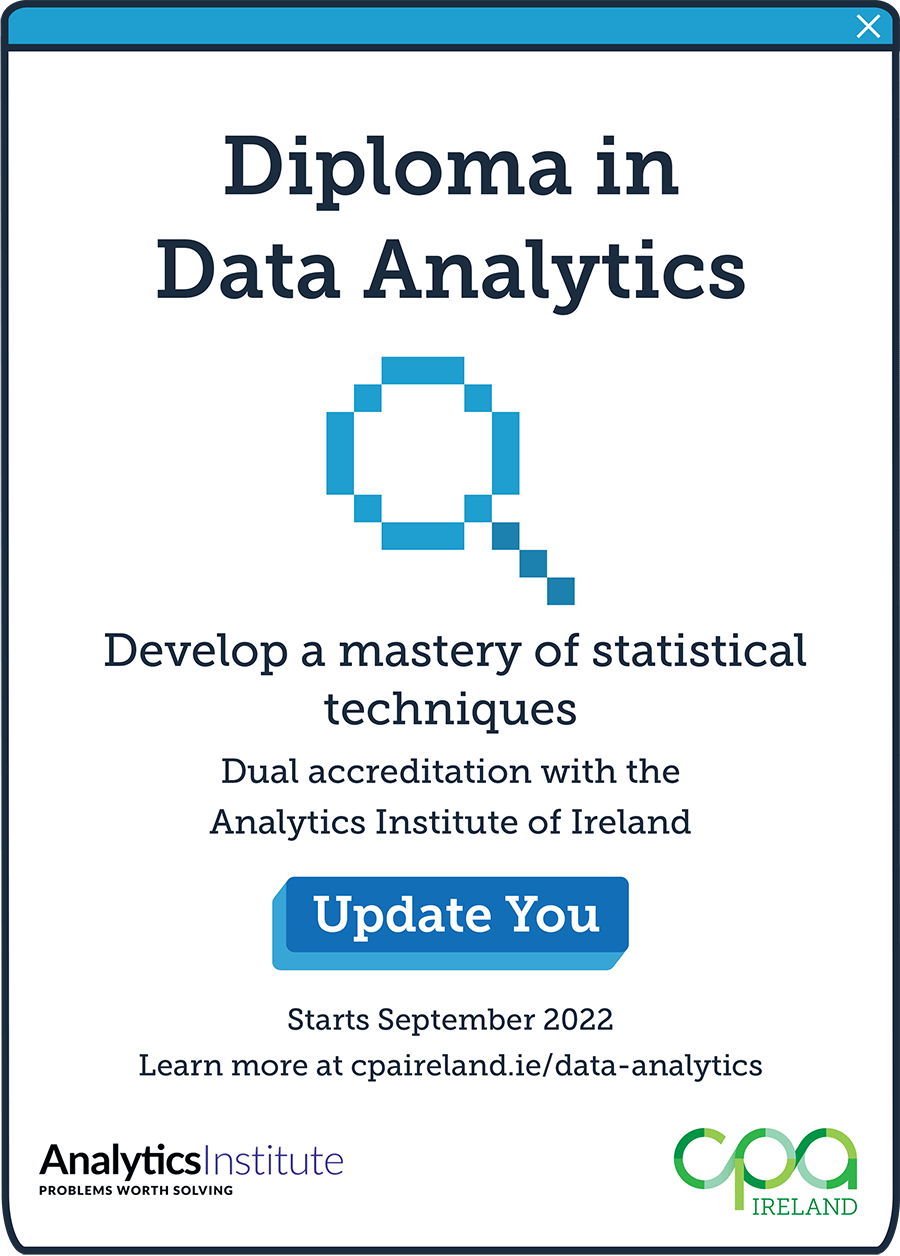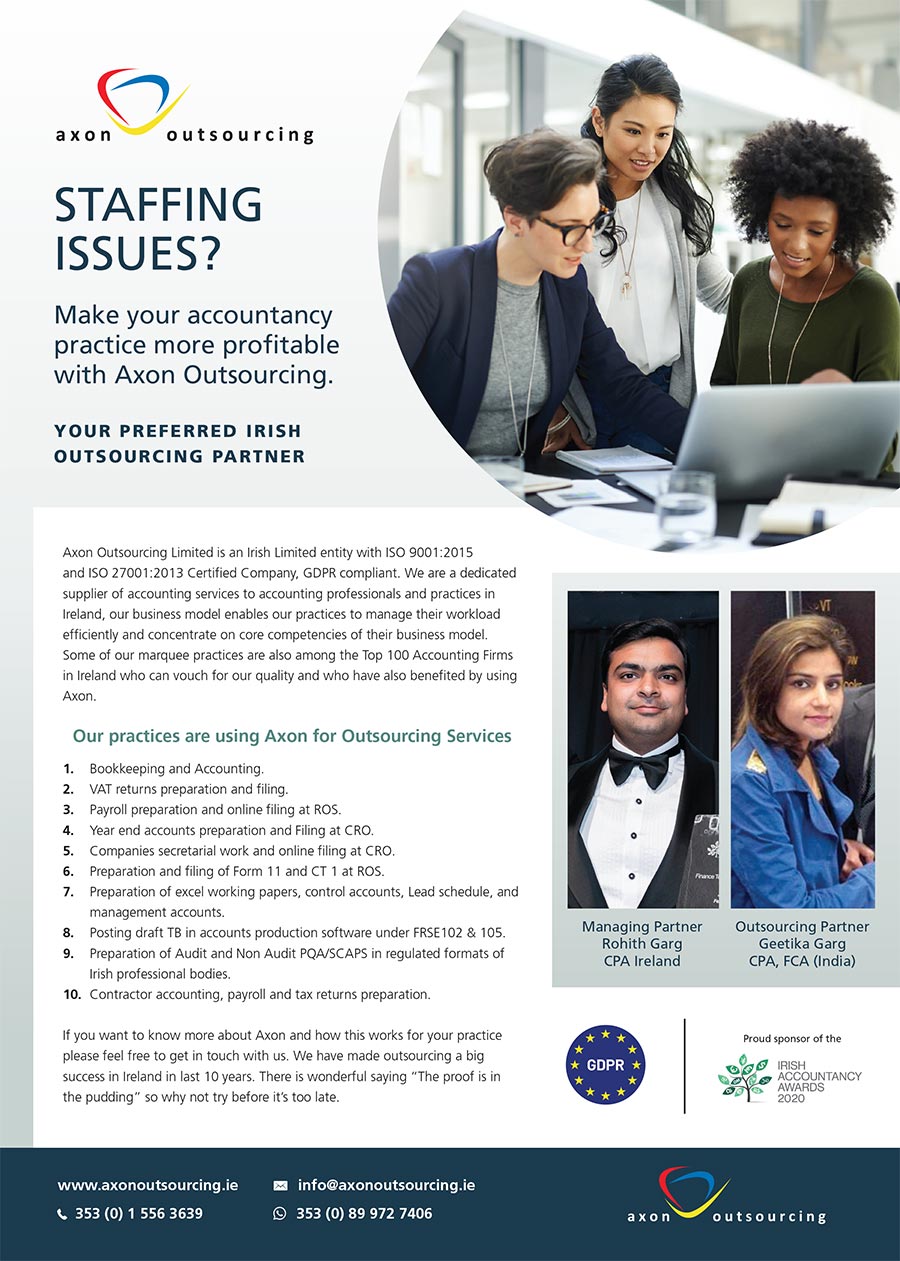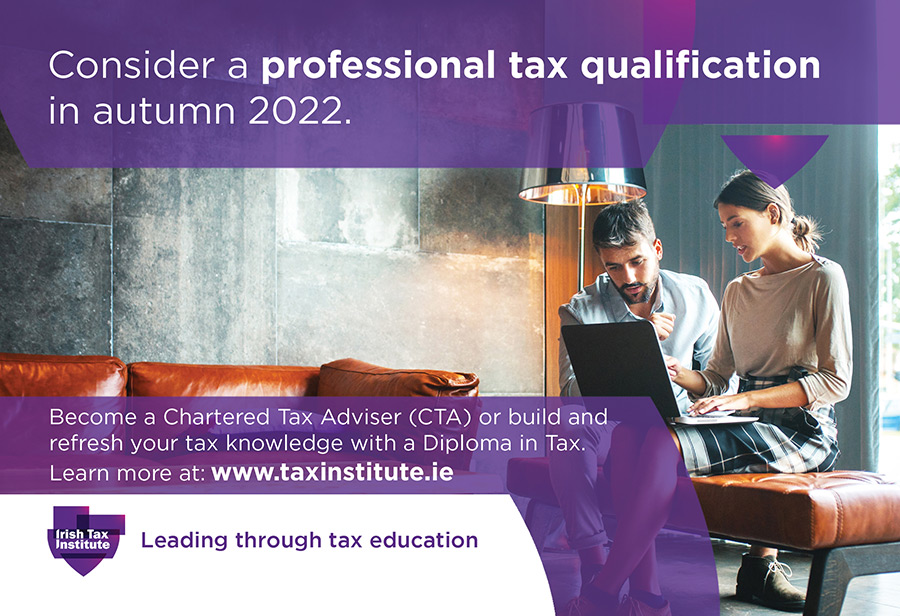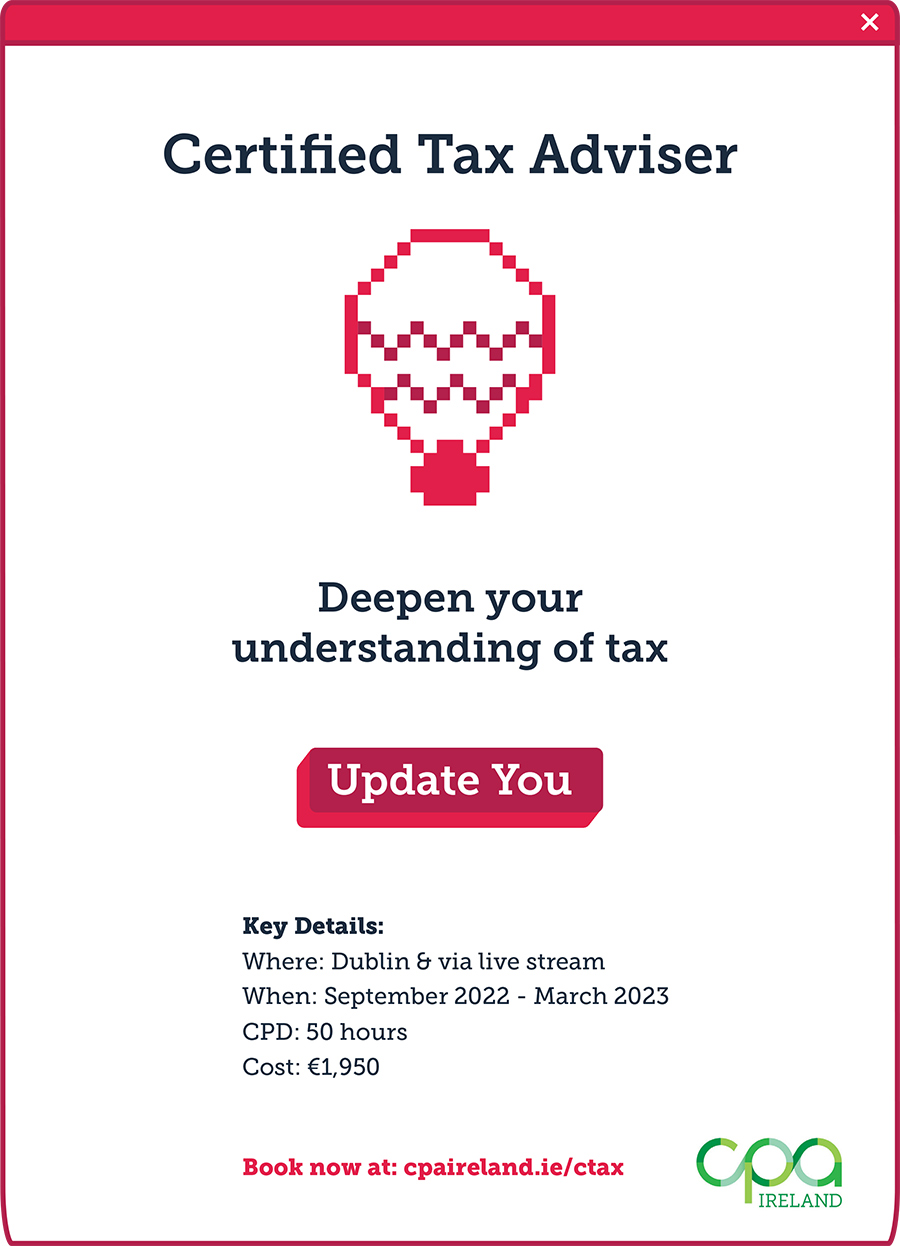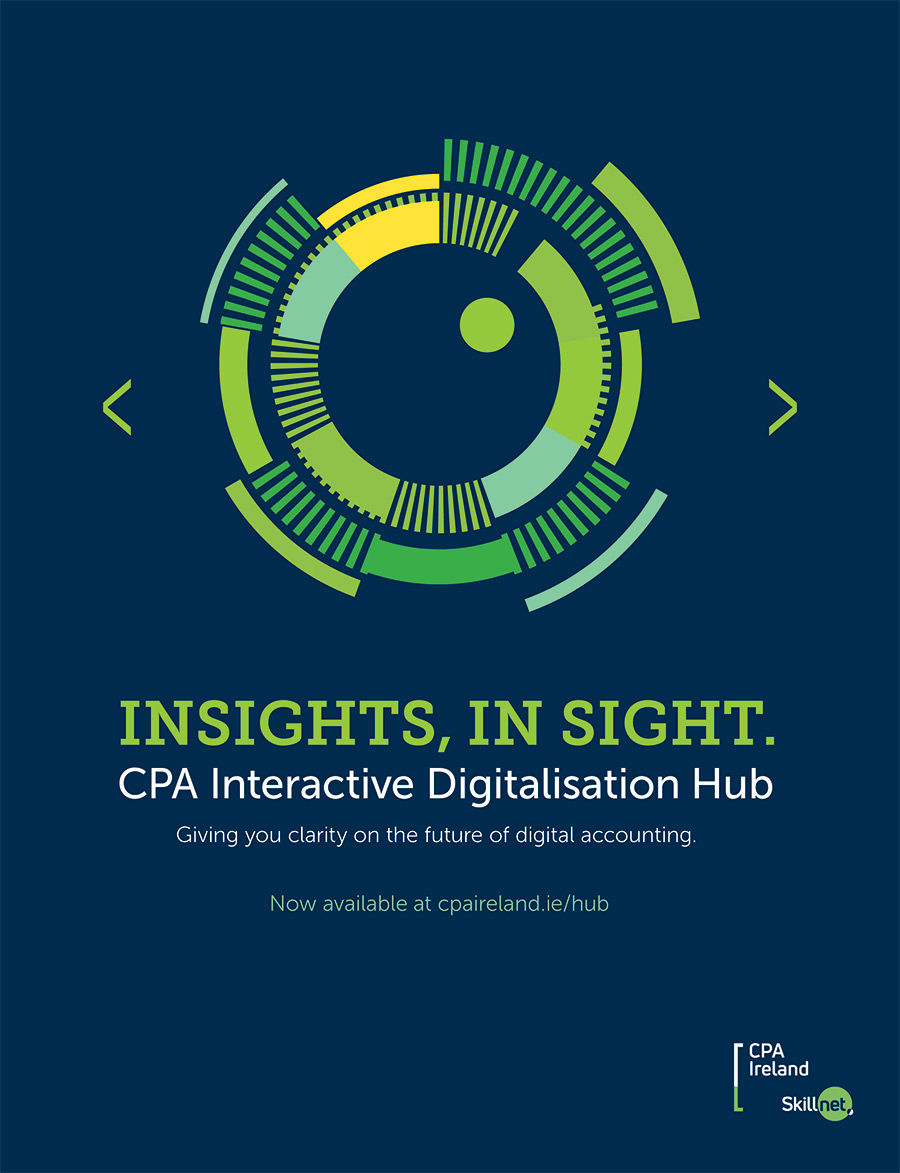September 2022
17 Harcourt Street,
Dublin 2, D02 W963
T: 01 425 1000
F: 01 425 1001
Unit 3,
The Old Gasworks,
Kilmorey Street,
Newry, BT34 2DH
T: +44 (0) 28 3025 2771
W: www.cpaireland.ie
E: cpa@cpaireland.ie
Patricia O’Neill
Chief Executive
Eamonn Siggins
Editorial Adviser
Róisín McEntee
Technical Adviser
Laurence D’Arcy
Ciara Durham
T: 086 852 3463
E: accountancyplus@gmail.com
Published by
Nine Rivers Media Ltd.
E: gary@ninerivers.ie
Welcome to the September 2022 edition of Accountancy Plus.

I am delighted to bring you our inaugural digital only version of Accountancy Plus. This enhanced publication has been created in collaboration with Vertiqul software and heralds a new chapter that combines an exceptional reader experience with having a very positive environmental impact. This format will allow you to easily share content, access the journal at any time and the digital copy also allows you to easily navigate to links within the content.
We are dedicated to becoming a sustainable organisation and the move to a digital only journal is an important step in significantly reducing CPA Irelands carbon footprint.
As the final quarter of 2022 approaches, Council and the Executive of CPA Ireland are continuing to focus on the key strategic pillars of Brand, Product, Customer Centricity, People & Global.
CPA Profile
In Practice
The Importance Of Economic Growth by Jim Power
Those of a right-wing ideological pre-disposition generally tend to advocate a low level of government interference in our lives and hence tend to advocate for lower taxes and lower levels of public expenditure. In contrast, those of a left-wing persuasion tend to advocate for high levels of public expenditure and high levels of taxation to pay for that expenditure.
Economists are often accused of being obsessed with economy and of ignoring society. I tend to be of the view that without a well-functioning economy and strong sustainable levels of economic activity, the tax revenues to fund public expenditure and hence society will not be generated. Witness the level of tax buoyancy experienced in Ireland over the past couple of years. Consequently, I believe that it is important to foster strong and sustainable economic growth to generate tax revenues, and then it is up to the political system to decide how those resources should be allocated.
CPA Profile
MacDara Howley

Company: Medtronic
Qualifications: CPA
Why did you choose CPA Ireland as your qualification route?
As with a lot of things in life I asked my father for advice! As a past President of the Institute of Tax he had a good knowledge of the options available to me. Given where I was in my career and my aspirations being in industry rather than in practise, CPA Ireland offered the versatility and industry insights that would accelerate a career change.
FINANCIAL REPORTING
Financial Reporting News
The IFRS Foundation’s International Accounting Standards Board (IASB) has today published its Third Agenda Consultation Feedback Statement and Snapshot outlining its priorities for the next five years.
The Feedback Statement explains the reasons for the IASB’s decisions and shows how the IASB responded to the extensive feedback from its diverse stakeholders.
This feedback, obtained via a public consultation in 2021, has helped to shape the IASB’s activities and work plan.
The three main strategic priorities are to:
- maintain the strategic direction and balance of the IASB’s activities while increasing slightly efforts to develop digital financial reporting and improving the understandability and accessibility of IFRS Accounting Standards;
- progress current projects; and
- add intangibles, statement of cash flows and climate-related risk in financial statements to the work plan.
Since 2021, premium listed commercial companies have been required to include a statement in their annual financial report, setting-out whether they have made disclosures consistent with the Task Force on Climate-related Financial Disclosures’ (TCFD) recommendations.
The FRC reviewed 25 larger companies more impacted by climate change and found that companies were able to provide many of the TCFD disclosures expected by the FCA’s Listing Rule, and climate-related reporting in the financial statements, marking a significant improvement in comparison with previous years.
However, there are several areas where companies will need to raise the quality of their disclosures in future years.
Likely developments in FRS 102 from the triennial review by Robert Kirk
Although FRS 102 is subject to a major review every 5 years, some minor changes have been reflected in the standard during the interim years. These are usually caused by developments in the external environment and have to be incorporated expediently into the standard. Recent examples of this are the amendments to accounting for rent concessions caused by Covid 19 and to interest rate benchmark reform caused by the demise of LIBOR. These changes have been incorporated in the latest edition of FRS 102 published in January 2022.
CSRD: a major shift towards a climate neutral EU by Hilde Blomme
The CSRD brings sustainability reporting to the same level as financial reporting for the first time ever. This is fundamental to support the EU Green Deal’s ambitions and transform Europe into the first climate neutral economy by 2050. Accountancy Europe welcomed the final text agreed by the co-legislators.
The accountancy profession will need to be ready for this crucial shift and make sure we can support the CRSD’s reporting and assurance aspects.
Law & Regulation News
Statutory sick pay will be paid by employers at a rate of 70 per cent of an employee’s wage, subject to a daily maximum of €110, which can be revised by ministerial order in line with inflation and changing incomes.
Leo Varadkar, Tánaiste and minister for enterprise, trade and employment, said: “This is a really important new employment right, that all workers will now have, no matter what their illness or job.
“Many employers pay sick pay, but the pandemic really highlighted the vulnerability of some workers, especially in the private sector and those on low pay. We’ve also been behind our European counterparts on this, with Ireland being one of the few advanced countries without such a scheme.
“No worker should feel pressurised to come into work when they are unwell. It’s not good for their own health obviously, but it’s also bad for their colleagues, any customers they deal with and their employer. From later this year, all workers will have the safety net of knowing they will not lose out on payment if they are unwell and can’t come into work.”
Source: www.irishlegal.com
The new law will require private sector organisations with 50 or more employees to establish formal channels and procedures for their employees to make protected disclosures, as is currently the case in the public sector, with the Workplace Relations Commission taking responsibility for monitoring and enforcement.
The law also provides for the establishment of a new Office of the Protected Disclosures Commissioner in the Office of the Ombudsman later this year.
The commissioner will direct protected disclosures to the most appropriate body when it is unclear which body is responsible to help ensure that all protected disclosures will be dealt with appropriately.
To access the article in full, refer to the following link.
Source: www.irishlegal.com
Navigating Gender Pay Gap Reporting by Sarah Fagan
In May 2022, the Department for Children, Equality, Disability, Integration and Youth published its guidance on how employers should calculate the Gender Pay Gap in their Organisation, which was updated in June 2022.
The guidance states that employers choose a ‘snapshot’ date in June 2022 of their employees and report on the hourly Gender Pay Gap for those employees on the same date six months later (December 2022). The guidance also outlined what information is required to be reported and how it should be used to calculate the gender pay gap. In summary, employers are required to report:
Finance & Management News
However, the number of transactions declined by only 9.3%to 117, EY said. The value of deals in the most recent period was down only 17 per cent from the second half of last year, underscoring how Irish M&A figures, because of the small size of the market, can be skewed by some large accords.
Feargal McAleavey, head of corporate finance at EY Ireland, said that a slowdown in investment “three to four months ago has slowly spread to Europe, with some impact in Ireland”.
While Mr McAleavey said there continued to be a lot of venture capital and private equity money globally looking for investments “there’ll definitely be a pullback in valuations” of private M&A deals, in line with a decline by stocks on public markets in recent times. The MSCI All Country World Index, a gauge of equities globally, has fallen by 17.5% so far this year.
To access the article in full, refer to the following link
Source: www.irishtimes.com
It represented a decrease of 4% compared to May and an increase of 16% compared to June 2021, when public health restrictions limited some in-person spending.
Debit card spending was 87% of total card spending at €7.1 billion, while credit card spending was at €1.1 billion.
The data shows that point of sale spending was 18% higher in June when compared to June 2021, at €7 billion, while ATM transactions increased by 6%, to €1.17 billion. ATM transactions continue to remain subdued compared to pre-pandemic levels and were 14% below February 2020 figures.
The volume of PoS card transactions was 10% higher in June when compared to June 2021. The average value of transactions remained relatively unchanged at €44.57 per transaction in June 2022.
The Central Bank figures show that total card expenditure outside of Ireland increased by 16%, or €66 million, when compared to the previous month. When compared to June 2021 this represents an increase of 170%, or €301 million.
Finance & Management
Leadership Insight: John McCarrick
Leadership Insight: John McCarrick

Trustee & Chairperson
Company: John McCarrick & Associates, The Kenyan Child Foundation CLG
Winner of the Irish Accountancy Award 2022 for CSR initiative of the year: Back to School.
What led you to a career in accountancy?
My first choice of career was in the area of sport, I had hope to gain an athletic scholarship to one of the American universities back in the early 1980’s that was offered to a small few. I was lucky enough to have been able to represent Ireland in track events from 200m, 400m & 800m both indoor & outdoor events European and World Athletic Championships.
From a young age, I knew that this mixture of scholarly pursuits and personal know-how was a space in which I could succeed in and the accountancy profession offered me that fabulous opportunity. I began my career as trainee accountant in 1980 with a firm of Chartered Accountants based in Fade Street, Dublin 2 and had a great mentor in Conor Ryan who allowed me progress to be appointed audit manager and remain with this firm until 1990.
Delivering Sustainability Starts With an Integrated Mindset by Kevin Dancey
Delivering Sustainability
Starts With an Integrated Mindset
by Kevin Dancey
Why is an Integrated Mindset Important?
Today, sustainability and financial information are often dealt with in separate parts of an organisation. In a world where sustainability and financial risks are converging, these information silos are barriers to developing better systems to enhance the quality and reliability of data and advance sustainability and enhance corporate reporting.
The Circular Economy by Louise Gorman & Seán O’Reilly
The Circular Economy:
Policy, Disclosure and the Role of the Accountant
by Louise Gorman & Seán O’Reilly
There are clear financial aspects and implications for businesses and organisations engaging in the circular economy, highlighting various roles for accountants and financial experts in areas such as planning, decision-making, and reporting. As policy developments suggest an expectation that all entities will engage in the circular economy in the coming years, the development of knowledge and skills in this area is a priority for third-level accounting and finance programmes and for continuous professional development.
Progressing the Sustainability Agenda by AIB
Progressing the Sustainability Agenda for Our Customers and Our Business
by AIB
AIB continue to embed Environmental, Social and Governance (ESG) considerations into our business processes.
For business customers we introduced an ESG questionnaire for borrowers in sectors more exposed to climate risk as well as launching the AIB Sustainable Lending Framework which outlines clear criteria by which we will report our green, transition and social lending.
Taxation News
Taxation News
In addition, TDM Farmers and intra EU Transactions has been marked as no longer relevant.
Source: www.revenue.ie
- The Movement of Excisable Products Manual
- The Administration & Control of Tax Warehouses Manual Part 2 – Breweries, Micro-Breweries and Cider Manufactures
- The Alcohol Products Tax and Reliefs Manual
- Guidance is also provided regarding the judgement given in the Y GmbH case (C668/20) concerning alcoholic products used in the flavouring of foodstuffs.
Source: www.revenue.ie
Taxation
Employee vs Self Employed by Mairéad Hennessy
Employee vs Self Employed
by Mairéad Hennessy
There has been much activity regarding the employment status of individuals in recent years. The area continues to be a target for Revenue scrutiny and there have been cases before the Tax Appeal Commission (TAC) and the Irish courts in recent years.
The implications for businesses are stark. From a practical perspective, businesses need to be aware that if Revenue find that an individual is an employee rather than a self-employed contractor, then the business engaging the individual will be held liable to account for any shortfall of PAYE, PRSI and USC due.

Dominos Pizza Case
TAXATION
Cryptocurrency & Common Tax Issues by Robert Halley
Cryptocurrency & Common Tax Issues
by Robert Halley
The whirlwind growth in cryptocurrency assets in the past couple of years means that if you haven’t already had clients enquiring to you about associated tax issues, that day isn’t far off. Indeed, such is the simplified nature of trading and initial exponential growth that created a hype around these, it is likely that there will be many amateur investors out there who would not have traditionally been within the self-assessment system, and who may come to you now for advice as personal tax season approaches. The aim of this article is to tease out the variety of considerations across different tax heads, while bearing in mind this is a volatile and ever-changing market sector.
Since this is such a new type of asset and is neither regulated nor covered specifically within tax legislation, the updated Revenue guidance1 published in April 2022 has proved helpful in demystifying some of the issues. As a further reference point, HMRC have published very detailed material2 which can be useful in understanding some of the technical aspects involved in dealing in these assets.
The term cryptocurrency covers a wide variety of investments, such as Bitcoin, Digital Currencies and Tokens. While the types differ, in simple terms what we need to consider for tax purposes is that these are assets which can be bought and sold and to assess the tax impact of such transactions. Given that these types of assets can often be used to purchase goods or services, this raises an additional complication compared to share trading. In looking at whether a disposal has been made, we are not only considering straight sales of the asset for traditional currency, but also the exchange of the asset for a different asset type, and the exchange of the asset for goods or services received.
In Practice News
IFAC welcomes the establishment of the International Sustainability Standards Board (ISSB), as well as jurisdiction or regional initiatives that can contribute toward the creation of a global system for consistent, reliable and assurable sustainability disclosure.
The number of audits considered good or requiring limited improvement has improved on the previous two years. It is clear that a combination of the FRC’s increasingly assertive supervision approach, as well as investment from the firms in their systems, people and capabilities to improve audit quality, is starting to have a positive impact.
Encouragingly, five of the largest firms had no audits requiring significant improvements. KPMG’s individual audit inspections have significantly improved, which is promising, but is not yet a trend.
The FRC will continue to closely monitor KPMG banking audits.
The inspection results at Mazars and BDO remain unacceptable. Four of the eight audits reviewed at Mazars, and five of the 12 audits reviewed at BDO required more than limited improvements. Specific supervisory plans have been developed to closely monitor BDO and Mazars’ priority actions.
The FRC will continue to ensure the challenger firms are prioritising high quality audit with a view to offering increased choice and resilience in the market, but growth ambitions must also be tempered by a focus on quality first and foremost.
Read the FRC audit quality inspection and supervision overview report here
Read the seven individual audit firm specific reports here
Source: www.frc.org
New Guidance on Professional Judgement for Auditors by Emer Kelly
The FRC intend the framework to have the status of non-prescriptive guidance. It is intended to be persuasive, encapsulating good practice.
PERSONAL DEVELOPMENT
Building a Coaching Culture in the Workplace by Edel Walsh
Building a Coaching Culture in the Workplace
by Edel Walsh
Coaching embodies the idea that with the support of a coach every individual can achieve their full potential. Not only will coaching benefit the individual personally but it can also benefit their workplace.
A business or workplace can hire coaches who have professional qualifications and accreditations. However, with the right tools and guidance, we can all be coaches. We can support our colleagues, teammates, direct reports and even
our friends through coaching.
This article sets out what is meant by coaching, the benefits of coaching and some core coaching skills. We will also look at a simple and effective coaching model, the “GROW” model.
The Collaborative Accountant by Ben Rawal
The Collaborative Accountant
by Ben Rawal
Time to collaborate?
Most commonly used in an environment that requires the successful interaction of at least two teams, collaboration has become increasingly important during the past 15-20 years. As a concept, it now has the potential to expand into other team-based areas, including accountancy and finance.
5 Major Cyber Security Threats You Need to Watch Out For by Paul Delahunty
INSTITUTE
Institute News
Institute News
New: CPA Ireland Sustainability Hub Coming Soon
In addition, Andrew Tobin from Stryve will take us through his experience with creating a carbon neutral business.
This event can be booked at https://portal.cpaireland.ie/Showcourses.aspx?id=22487.
Key developments in sustainability standards for non-financial reporting will be monitored by CPA Ireland with detailed information on when and how that reporting will impact your business and clients. The hub will cover all areas of importance to Irish businesses including Audit, Financial Reporting, Strategy, ESG Reporting, Sustainable Lending, Carbon Footprint reduction, Employee Health & Wellbeing as well as offering live sessions with key industry experts’ in sustainability and case studies of those who have managed a sustainable journey.
Further details on this exciting development will be communicated over the coming months.
Winning the War on Trainee Talent
The war for accountancy talent has intensified over the last few years. Globally organisations are struggling to attract and retain trainee talent. In Ireland, a decline in student registrations across all professional accountancy bodies exacerbated the situation and in 2018 the number of new accountancy students stood at -27% below pre- recession levels making it extremely challenging for members and employers to source accountancy trainees.
In response to the challenging recruitment market CPA Ireland launched the Trainee Placement Service in 2019. This complimentary recruitment initiative was set up to support members and employers in finding the right trainee talent for their organisation and to assist prospective students in finding a CPA trainee role. The team at CPA Ireland built out a robust trainee candidate attraction strategy including a brand-new job board, digital advertising, email campaigns and candidate personas. Trainee candidates receive ongoing support throughout their trainee job search with the ability to access a CV review, interview coaching and feedback. Members & employers have access to high calibre trainee talent without the high – costs associated with recruitment agencies and receive expert advice throughout the hiring process.
The Trainee Placement Service has been a huge success for CPA Ireland. Candidates who secure roles through the placement service are automatically registered as CPA students and in 2021 the service was cited as one of the top reasons perspective students choose the CPA Qualification. This year we have witnessed a notable uptick in interest from students and employers in both practice and industry.
Along with an increase in engagement we have achieved some impressive recruitment metrics which included filling a recent trainee role with a leading aviation company in just 10 days!
If your organisation has trainee recruitment plans now or in the future, please reach out directly to Caroline Moloney: cmoloney@cpaireland.ie
CPD News
CPD News
Women in Business – “Celebrating Women”
The Women in Business 2022 events are taking place in Cork on 7th December and in Dublin on 15th December.
As usual we will hear from top class speakers and enjoy some canapes and wine whilst we network.
Dates & Locations:
7th December
Hayfield Manor, Cork
15th December
CPA Ireland offices,
17 Harcourt Street, Dublin 2
Time: 5pm – 8pm (registration will start from 4.30pm)
CPD Credit: 3 hours
Cost: €50 for CPA members
End of CPD Cycle
Practice:
- 75 structured hours
- 45 unstructured hours
Industry:
- 60 structured hours
- 60 unstructured hours
For our newer members who have qualified in the past two years your CPD requirements are calculated on a pro rata basis.
For example, if you work in practice and you were conferred in December 2021 you must complete 25 hours by the end of 2022 (50 hours if you were conferred in December 2020). If you work in industry and you were conferred in December 2021 you must complete 20 hours by the end of 2022 (40 hours if you were conferred in December 2020).
We will be running an extensive programme of conferences, webinars, full day courses and Post Qualification Specialisms throughout the remainder of the year – more than enough to fulfil all your requirements!
If you have any queries on your CPD hours please visit our CPD section of the website or contact Rachel Hawker, rhawker@cpaireland.ie
Student News
The results of the August 2022 examinations, which were hosted on our Cirrus online examination platform and remotely invigilated using Proctorio Artificial Intelligence technology will be available online on Friday 14 October 2022, six weeks after the final examination.
The results can be accessed by logging into their ‘MyCPA’ Dashboard.
Good luck to all students who sat examinations in August and are awaiting results.
Thanks to all students who have applied for membership as part of “Cohort 1”. This group included students who passed their final examinations from 2019 up to and including April 2022. Congratulations to those applicants who have been accepted for membership.
Students who complete their examinations in August 2022 will be included in Cohort 2 and will receive formal invitations to apply for membership following the release of the August 2022 examination results.
Students in Cohort 2 are reminded of the following deadlines:
- 7 October – all outstanding training records to be submitted (this does not apply for those students who have already been confirmed as “Training Complete”
- 4 November – full application for membership
Due to the short timelines between publication of exam results and the deadline for applications we strongly encourage all students to gather, as soon as possible, the relevant information so as to be able to submit their application documentation on time.
The following documents, if not previously submitted to the Institute, should be submitted with each application to membership.
Information & Disclaimer & Student NewsPublication Notices
Accountancy Plus is the official journal of the Institute of Certified Public Accountants in Ireland.
It acts as a primary means of communication between the Institute and its Members, Student Members and Affiliates and a copy is sent automatically as part of their annual subscription. Accountancy Plus is published on a quarterly basis.
The Institute of Certified Public Accountants in Ireland, CPA Ireland is one of the main Irish accountancy bodies, with in excess of 5,000 members and students. The CPA designation is the most commonly used designation worldwide for professional accountants and the Institute’s qualification enjoys wide international recognition.
The Institute’s membership operates in public practice, industry, financial services and the public sector and CPAs work in over 40 countries around the world.
The Institute is active in the profession at national and international level, participating in the Consultative Committee of Accountancy Bodies – Ireland – CCAB (I) and together with other leading accountancy bodies, the Institute was a founding member of the International Federation of Accountants (IFAC) – the worldwide body. The Institute is also a member of Accountancy Europe, the representative body for the main accountancy bodies The Institute’s Offices are at 17 Harcourt Street, Dublin 2, D02 W963 and at Unit 3, The Old Gasworks, Kilmorey Street, Newry, BT34 2DH.
The views expressed in items published in Accountancy Plus are those of the contributors and are not necessarily endorsed by the Institute, its Council or Editor. No responsibility for loss occasioned to any person acting or refraining to act as a result of material contained in this publication can be accepted by the Institute of Certified Public Accountants in Ireland.
The information contained in this magazine is to be used as a guide. For further information you should speak to your CPA professional advisor. Neither the Institute of Certified Public Accountants in Ireland or contributors can be held liable for any error, or for the consequences of any action, or lack of action arising from this magazine.


